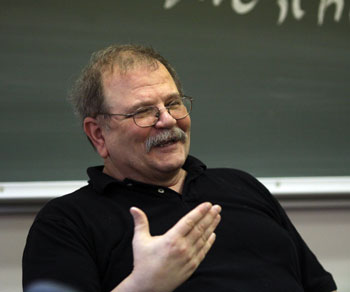A Man's Life: Gathering the One Great Songby poems by Samuel Green |
| Printer-friendly version | Email this article |
|
An ongoing conversation about what if means to be a man in the 21st century. “It was an amazingly astute statement that would not go away,” Green, the former poet laureate from Washington, told a Wabash audience in February. “It forced me to ask myself, ‘What kinds of poems do I really want to write, and what sort of life might bring them into being?’” The answers Green found led him and his wife, Sally, to remote Waldron Island in the San Juan chain north of Puget Sound. There he found not only his poetic voice, but also a life among others and, as he writes, stories that “gather as tiny birds/add themselves one & one to the flock, their small throats gathering the One/Great Song that is more than themselves alone.” “In a small community, what happens to people matters to you in very immediate ways,” says Green, whose home on the island is a log house he and Sally built with their own hands. “You learn to live with people you don’t like, you learn that not liking someone is not an excuse for not being with them. “I had to live with people as they are, not the way I wanted them to be, which was a great gift for me: I had to change myself because I couldn’t change other people.” Some poems from this man's life as a son, a husband, and a father: On Board the Sea Lassie, Summer, 1944 I can bring back the boat, a purse seiner built in the 20s, white paint flaking from her rails. She has made her set & swings like a clapper against the enormous bell of Alaskan sky. I can bring back the gulls floating I can bring back the crew, & I do, My father is easy: there are pictures of him then Having brought them here, there is still I bring my father back because I want to tell that boy he will not beat his own two sons, & they will not beat theirs, to tell him though he’ll mourn the fact he cannot mourn his father’s death, I know I’ll weep for his. But the boy can’t hear me. He has become an old man in whom pain has lived like a flapping salmon in his ruined back his whole life long. I could tell him, & try whenever I visit. But that’s not the same thing, is it? At the Pond’s Edge I come to her the way I’d come My hands move on her flank like a drake hanging now on, now above the still water. & still be a man, her slow teaching no longer the body’s daily insistence, into middle age with sweet understanding, explodes into sudden wings on the water, Children, Waking —for Laura Walker In the long night, when our sons wake These poems are from The Grace of Necessity, Carnegie-Mellon University Press, (2008), winner of the 2008 Washington State Book Award for Poetry. Reprinted with permission.
|

 Sam Green was living in the Seattle area in 1978 and struggling to find his writing voice when poet Carolyn Forché asked him to consider this: “If you want to write a certain kind of poem, maybe you should consider living the sort of life from which such poems might come.”
Sam Green was living in the Seattle area in 1978 and struggling to find his writing voice when poet Carolyn Forché asked him to consider this: “If you want to write a certain kind of poem, maybe you should consider living the sort of life from which such poems might come.”